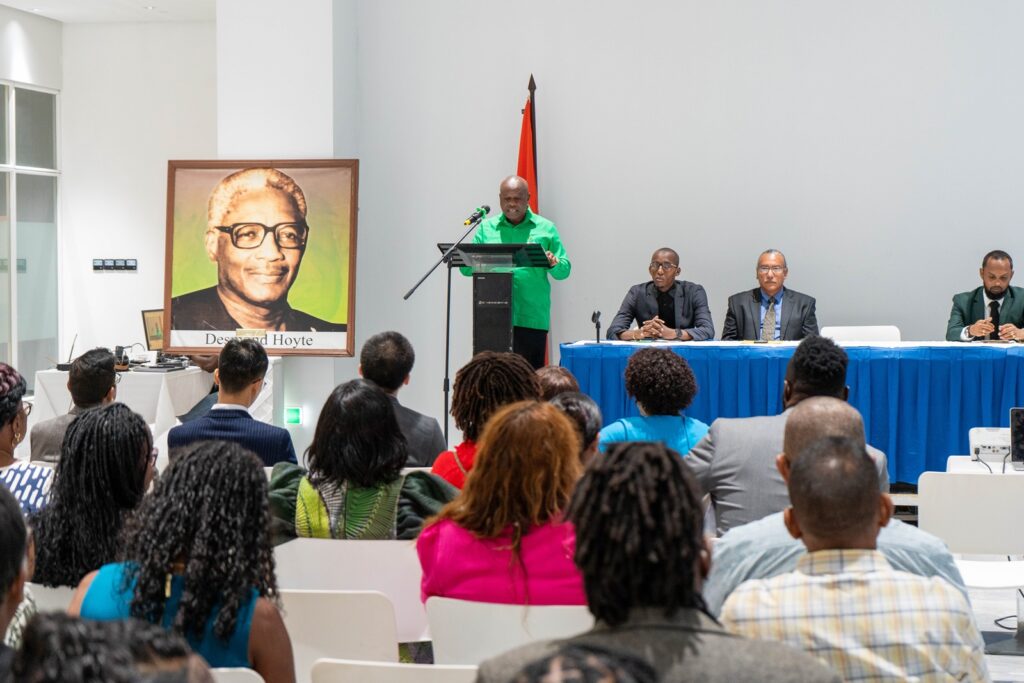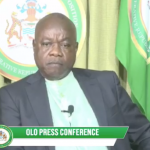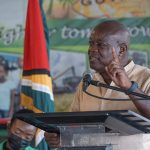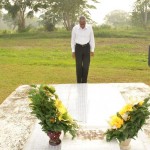
Late leader of the People’s National Congress and former President Hugh Desmond Hoyte was remembered as a true Guyanese Statesman, who placed the nation above partisan politics, according to Leader of the People’s National Congress/Reform (PNC/R), Aubrey Norton.
Norton delivered the Hugh Desmond Hoyte 9th Commemorative Lecture at the Pegasus Suites last Friday.
Mr. Norton said while the party, its members and supporters endured some of the most ill-informed criticisms of Mr. Hoyte, the record would show that Mr. Hoyte was a Statesman, who transformed the Guyana economy and promoted national development.
“More discerning minds have concluded that Mr. Hoyte’s presidency had a transformational effect on the politics, economics and culture of this nation. Many scholars, observers and citizens of this country have recognised that Mr. Hoyte had that element in him which allowed him to place the interests of the nation above partisan political considerations,” the PNCR Leader said.
He said Desmond Hoyte had become skilled and experienced in the politics of Guyana, so much so, that he understood what decisions needed to be taken to make the country truly independent and free. “He was a man who understood the international environment and developed his policies and programmes cognisant of the changing world at the time. Mr. Hoyte sought to put policies in place which would benefit not one section of the society but the society as a whole. He was prepared to withstand criticism for doing so. A lesson that is relevant now. He weathered the storm of criticism but many in hindsight now applaud him for his leadership on the ethnic issue in Guyana,” the PNCR Leader said.

As a widely read and cultured human being, Mr. Hoyte, was equally outstanding in his ministerial roles, and stood out as one of Forbes Burnham’s most outstanding Ministers.
After becoming Minister of Home Affairs in 1969, Mr. Hoyte then went on to become the Minister of Economic Development, Minister of Finance, Minister of Works and Communication, and finally First Vice President and Prime Minister of Guyana.
“In these Ministerial positions, Mr. Hoyte acquired a comprehensive understanding of the racial, ethnic, social and economic fabric of this nation. In his assessment he recognised that Guyana was a complex polity consisting as it does of a multi-racial, multi-ethnic tapestry which had to be delicately and prudently ordered into a cohesive and national whole. At the heart of this matter was the question of unity of the races. As a Minister and as a student of the History of his own country it could not be lost on him that racial harmony and unity were preconditions for real economic developments. He had seen how the riots of February of 1962 and the racial tension of the society had cast a pall over the nation’s development. He had seen too how the political dislocations of the post-election period of 1997-98 had slowed and harmed the national economy. The question of the importance of race had to be in the forefront and centre of his political endeavours. I believe today this is still a critical issue,” Norton said.
He said Mr. Hoyte saw the period after the signing of the Herdmanston Accord as an opportunity to change the politics of Guyana.
The Herdmanston Accord and the St Lucia Statement, Norton added, were the foundation for change, and recognised the need for Constitutional Reform, greater democracy in society, the entrenchment of the Human Rights of citizens, and improvements in the mode of governance.
Guyana today, he said, could learn a lot from Hoyte and his policies that promoted a unified country.











You must be logged in to post a comment Login